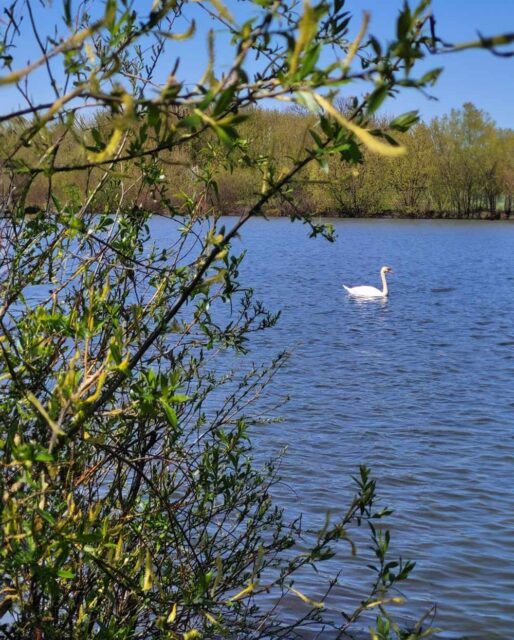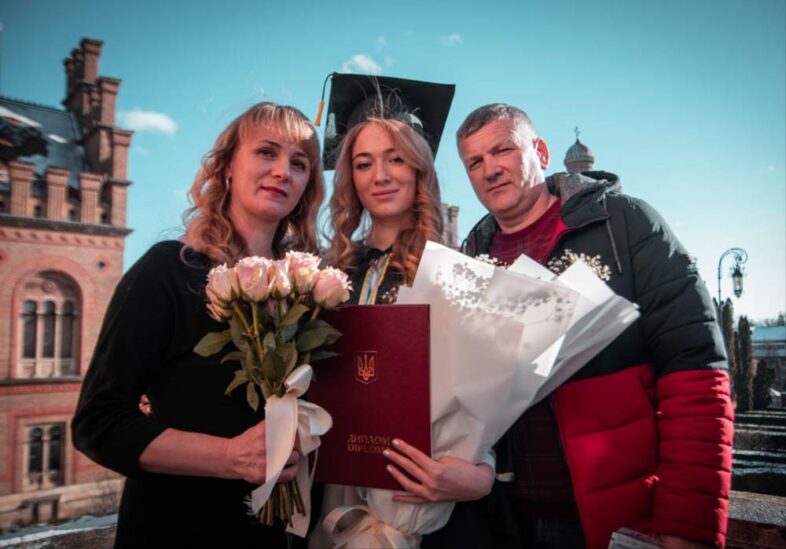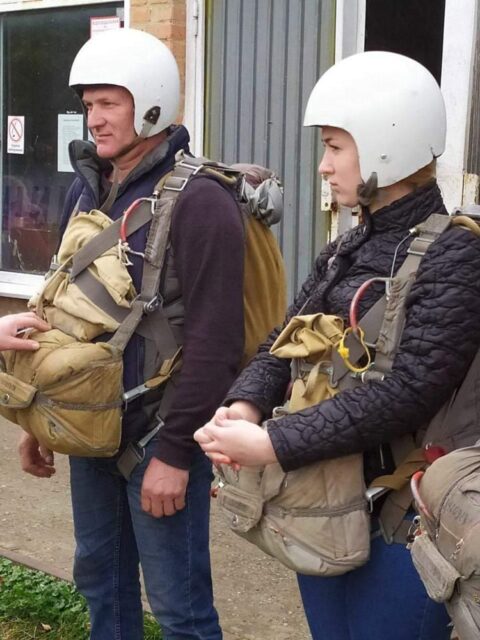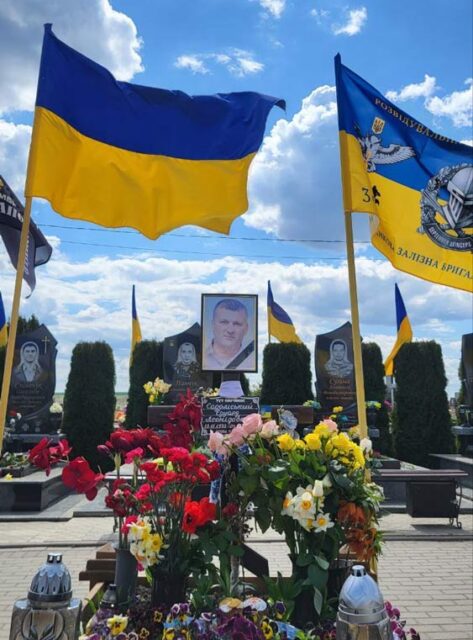“Sometimes I just go to Dad’s grave to vent about everything and everyone,” Bohdana Sadomska reflects, her voice laden with the weight of a heavy loss. Her father, the hero Eduard Sadomskyi, was killed in a combat mission during the initial months of the full-scale Russian invasion, on April 4, 2022. Bohdana fondly remembers their exchanges—how she would say, “Daddy, I love you,” and he would affectionately respond, “I love you more.” On Sunday, April 3, 2022, when she called him while he was on the frontline in Kharkiv, she did not receive his familiar, reassuring words. The silence that followed starkly contrasted the joyful banter they once shared, revealing the gravity of the moment and the profound absence now sharply felt.
***
Place of strength
With Bohdana Sadomska as our guide, we stroll beside the pond in Khutorivka, just a stone’s throw from the Ukrainian Catholic University where we are both pursuing master’s degrees in the School of Journalism and Communications. Though our feet are firmly planted here, in Bohdana’s reminiscences we are transported to a serene lake near the village of Korytna in Khmelnytskyi region. This expansive 22-hectare pond, a vestige of grandeur, has been under the stewardship of Eduard Sadomskyi, Bohdana’s father, since 2000.
The lake sprawls regally across the Khmelnytskyi countryside, its fish-stocked waters a quiet testament to a bygone era. Beneath the surface and among the reeds, frogs create a symphony, their croaks mingling with the gentle ripple of the water. In the distance, a white-winged swan moves with languid grace, adding a delicate rhythm to the murmur of the lake. The azure sky, mirrored in the lake’s surface, reshapes the contours of its clouds, adjusting them with an almost tender touch before the reflective expanse.

“I like blue,” Bohdana says, her gaze sweeping over the serene landscape. “Dad really cherished this colour. First, because he was a paratrooper, and the sky became a symbol of his love. And second, because he adored water just as much. He poured his soul into the pond: stocking it with fish, catching them, and selling them. Later, he excavated a smaller pond on his own. It was his personal project. That’s why walking by the lake feels so special to me. Water evokes my childhood, a sense of comfort, and memories of Dad. We used to ride an inflatable boat together with my younger sister. He taught us how to row and swim. I felt free; even though the pond seemed to confine me, it gave me a sense of boundless freedom. We’re not emotionally ready to let go of the pond. Dad invested his entire life into it. We grew up there. It’s a place of profound significance.”
The courtyard near the university is chilled by the wind, which sneaks through our spring jackets and bites at the skin. We make our way to the university dining hall for a hot coffee. Bohdana’s memories guide me, as if taking me by the hand, to reveal her and her father’s favourite café in Khmelnytskyi—Savoury Coffee. Unassuming at first glance, this family-run roastery is a hidden gem cherished by military personnel and police officers alike. The café is warm and inviting, serving exceptional coffee brewed from beans roasted and ground on the premises. Near the tables, a large shield adorned with military patches stands as a silent testament to those who frequented the place. After her father’s death, Bohdana left his patch there, a silent tribute to his memory.
“And my dad was always restless,” Bohdana reflects, with a hint of nostalgia in her voice. “He had a real passion for coffee. Strong, unyielding coffee. But sitting in a café and drinking it—that was a different story. He needed to be on the move, always occupied.”
The coffee machine near the dining hall hums into action, punctuating the quiet with its mechanical symphony. “Sh-sh-sh, tik-tik, tik-tik, thud, whoosh, zzzzzz,” the motor whirs as Bohdana’s Americano brews and froths. Her memories unfurl with the steam.
“There was this one time when I was scrambling to finish my master’s thesis,” she continues. “I needed to get it approved, but I was falling behind. Dad kept nudging me. He was so meticulous and dependable. If he said he would do something, he would. My mum and I, on the other hand, are a bit scatterbrained, always leaving things to the last minute. Though most people say I resemble Dad,” Bohdana reminisces. “He kept urging me: ‘Come on, faster, come on, faster.’ I was finally ready, and then he asked, ‘So, are we going for coffee?’ That’s how we ended up at that café.”

Daughter of a paratrooper
We settled at the farthest table by the panoramic window in the bustling dining hall. Bohdana retrieved her phone and displayed a cherished photograph: she and her father, both outfitted in white helmets. Their shoulders bore the weight of backpacks with primary parachutes, small reserve bags fastened with red metal clasps, and an additional bag for future packing. The image immortalised the moment before their inaugural parachute jump, a special gift from her father for Bohdana’s 20th birthday.
“We were eager for a second jump,” Bohdana reminisces. “He used to say that the first jump is all about euphoria, a thrilling uncertainty. By the third, you’re executing a well-practiced routine. But the second jump—that’s the real challenge. You know what to expect, yet you’re still grappling with the reality of it.”

Father’s lilies
Bohdana scrolls through her smartphone, revealing a gallery of her father’s handiwork: a hand-forged Ukrainian coat of arms on the gates, a wooden gazebo, a decorative windmill, a garden fountain, and three smokehouses, one left unfinished.
“No one knows what he intended for that last one,” she remarks, her voice tinged with wistfulness. “Even his friends who helped him don’t know. He was never the one to share his plans. He’d just say, ‘I’ll make it, and you’ll see. You’ll see, you’ll see. Do you really need to know? You’ll see.’ And now I understand that, yes, I did need to know, but I’ll never see it,” she adds, her fingers idly tracing the cross on her delicate necklace.
She speaks of planting two thuja trees near her father’s grave. Eduard had a deep affection for his garden, where lilies flourished among the flowers and thuja among the conifers. He nurtured the stock that scented the air with sweetness on starry nights, tended cherry and sour cherry trees whose fruits became homemade wine, and cultivated delicate irises, thorny roses that wove around the garden arch, tree-like peonies, and hellebores that heralded the arrival of spring.
One of Eduard Sadomskyi’s favourite flowers was, without a doubt, his daughter. Bohdana, with her flowing hair pinned up in a clip like golden stalks of wheat, embodies his legacy. Soft waves of bangs frame her forehead while her large grey eyes—gentle as pussy willows—gaze at life’s trials with steely resolve. Her neck is adorned with a multicoloured scarf featuring Ukraine’s Bukovynian Podillia patterns, symbolising the tree of life that intertwines past, present, and future. Clad in an elegant business suit that accentuates her graceful figure, the black-and-white palette of her attire subtly signals her adherence to a binary view of truth and deceit. In her poise and character, she mirrors her father’s confidence, strength, and sense of justice. “Bohdana Sadomska truly is her Dad’s daughter” was a familiar refrain for her.
Engraved on a silver bracelet that she wears—a bit scratched and worn—are the words “Daddy’s joy.” It circles her right wrist like a cherished talisman, a keepsake from her father, reflecting his endearing nickname for her.
“My dad had an extensive circle of friends and acquaintances,” Bohdana recounts. “He was remarkably adept at making connections. Yet, if someone acted dishonourably, he simply cut them off, indifferent to their opinions of him. If he deemed someone unworthy, they were out of his life. Despite his strictness, he was profoundly loving and open. We could talk about anything, and he granted many of our wishes. It’s peculiar because, while he had a sharp and principled nature, his love for justice was unwavering.”
24 February 2022
The dining hall had grown markedly quieter, and the din of conversations faded as our discussion with Bohdana delved into more profound territory.
“On February 24, I knew my father was going to leave,” Bohdana recalls with a distant gaze. “He told me in the evening that he was heading to the enlistment office the following morning. He asked me to keep it a secret, and I did. Now, I find myself regretting it slightly—perhaps someone could have persuaded him to reconsider. Although, knowing his stubbornness, I doubt it would have made a difference. Still, I understand that if Dad had suspected I might ‘betray’ him, he wouldn’t have confided in me.”
“I only knew he had left in the morning. When he returned home, he said, ‘I’ve got five minutes to get ready.’ He prepared quickly. Mum was inconsolable. As for me, I couldn’t shake the feeling that he would come back.”
Eduard’s comrades were baffled by his decision to join a tank brigade as a squad commander despite his extensive network of friends in the military who could have secured him a safer position. Bohdana’s father never sought such favours. He was resolute in his commitment to serve. When offered a transfer before heading to the front, Sadomskyi remained steadfast.
“Nobody but us” was the paratroopers’ motto that Eduard Sadomskyi carried with him until the end, a guiding principle through the fractured line of fate stretching into the infinite.
4 April 2022
On Saturday, April 2, Bohdana, her mother, and her sister busied themselves tidying the summer house in preparation for the arrival of displaced persons.
“It was the first moment I truly felt Dad’s absence,” Bohdana reflects, her voice tinged with the gravity of her memory. “The yard, meticulously arranged by him, the presence of his dog, Lord, and us—all were there, but he was missing. It was a strange, hollow sensation—there was no sense of protection, no one to lean on. That evening, as we were heading home, Dad’s calls kept coming. It felt like he needed to talk, to connect. On Monday morning, he phoned my mother. When she asked, ‘How are you?’ he replied with a subdued ‘Everything is fine… for now,’ a stark departure from his usual, reassuring ‘everything is fine.’ After that, the silence fell—no further word from him for an entire day.”
On April 4, Eduard Sadomskyi was killed. “On the 9, we laid our hero to rest at the Alley of Glory. Since then, the national anthem has seemed like a funeral march, and the flag became the symbol of mourning.”

Flag
We paused our conversation briefly, the silence between us a deliberate choice as crucial to our dialogue as the words themselves. Bohdana had shared how she and her father cherished their moments of deep conversation and quiet reflection. In the hushed solitude of the nearly empty dining hall, their shared silence enveloped us.
“I vividly recall the day we collected Dad’s backpack,” Bohdana resumed, her voice steady with the weight of memory. “It was around ten kilograms. Mum suggested we ask Uncle to pick it up since he was driving and could retrieve it from the post office. I had always been sheltered, living in a cocoon where lifting heavy things or tackling difficult tasks was never my responsibility.”
“But suddenly, I was all alone. All the burdens Dad used to bear now rested on my shoulders. I knew I had to be the one to take that backpack first.”
Bohdana was resolute; the backpack was not to be collected by anyone else. So, she and her mother decided to make the trip to the post office themselves. Wrapped in protective film, the backpack was cumbersome, but for Bohdana, it was a challenge she was prepared to face. Thus, they agreed to carry it between them, each taking turns.
When we opened the backpack, a flag emerged from the top pocket. Bohdana paused, her voice tinged with a mixture of reverence and sadness. “I don’t know if all soldiers do this,” she said, “but I was told that a squad commander carries a flag in his backpack.” The flag bore a call sign, and in that moment, Bohdana discovered her father’s codename: Flag.
The process of sorting through the backpack wasn’t immediate. Bohdana pulled out the flag, the uniform, and a notebook before her mother took over. In the course of unpacking, her mother stumbled upon an item she had been searching for—unexpectedly and for the past two months.
“I remember how, in March, Mum was frantic about her missing leather glove. We joked that she must have left it at work or on the bus,” Bohdana recalled. “She had retraced her steps and rearranged drawers, but it was nowhere to be found. One glove was at home; the other was in the backpack. Dad used to fall asleep with Mum’s hand resting on his heart.”
Father’s love protects me even in my sleep
“There are times when I visit Dad’s grave just to vent about everything and everyone,” Bohdana confides. “I find myself saying, ‘Dad, why does no one understand me except you?’ It’s the hardest part—managing physical responsibilities is one thing, but lacking understanding and support is truly exhausting.”
Bohdana recalls the moment she decided to apply to UCU. “I was terrified to tell my grandmother. I didn’t know how she’d react. She said, ‘My God, people are getting married, having children, and here you are, still studying. Maybe you should have a child instead.’ I know she cares deeply for me, and I love her in return. But we see things differently, and sometimes it’s hard to bridge that gap. I cried so much over the decision to study. It felt like a choice between being an adult, burdened with responsibilities, and seeking refuge in academia.
Then, I had a dream about him. In the dream, Dad was fine—barbecuing kebabs while we all gathered around the gazebo and hammock. I was being tugged from all directions, and Dad intervened with a firm hand, saying, ‘Wait, she’s going to study.’ That’s when I knew I had to go.”
The afternoon sun cast a muted glow as we wrapped up our last classes for the day and made our way to the bus stop near the university. Passing by Hutorivka Lake, its surface mirrored the sombre grey sky, still and watchful, as though it had paused in silent contemplation. We exchanged reflections on our studies in journalism and communications, and the tranquil scene was a stark contrast to the vibrant discussions.
Bohdana recalled her final moments in her father’s beige estate before it was listed for sale. She had touched the cold steering wheel, her hand moving slowly across its surface as she took in the interior. Her eyes fell upon an unexpected object nestled between the front seats. She reached for it, revealing her father’s chevron. The find seemed to whisper to her, carrying a message of unspoken affection:
— And I love you more.

